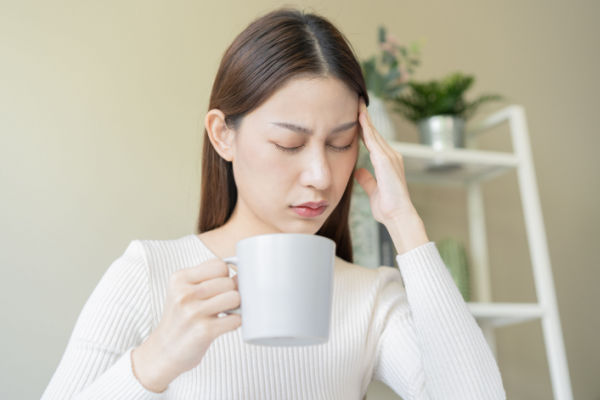Coffee is a beloved morning beverage. Not only is it customizable and portable, but it’s also a great way to boost your energy and get you moving and focused. With such greatness, however, comes potential side effects.
For some, coffee can cause unfortunate dizzy spells and lightheadedness. This is often attributed to caffeine, a stimulant present in coffee, that can reduce the blood flow in the brain by up to 30%. There are several other reasons why someone might feel dizzy while drinking coffee including consuming too much, being dehydrated, drinking coffee on an empty stomach, one’s personal caffeine tolerance, having a caffeine allergy, and caffeine interacting with certain medications you might be taking. Depending on the reason that caffeine makes you feel dizzy, there are several options you can try to reduce or eliminate this issue. In this article, we will dig deeper into the reasons why coffee can trigger lightheadedness, as well as some ways to help prevent it from happening in the future.
Drinking Too Much Coffee
The FDA recommends that people consume no more than 400 mg of caffeine per day, which is the equivalent of approximately four cups of coffee. Drinking more than the recommended daily allowance is considered dangerous and can cause people to experience dizziness.
On top of lightheadedness, other side effects that someone may experience after ingesting large quantities of coffee include:
- Headaches
- Nervousness and jitters
- Mood Swings
- Insomnia
- Frequent bathroom trips
- Increased heart rate
Dehydration
Coffee promotes diuresis, or an increased amount of urine to be produced, and sparks frequent bathroom trips. As a result, there is an increased loss of electrolytes, which can lead to dizziness. If you are someone who doesn’t drink a lot of water to begin with, drinking coffee can cause you to become dehydrated and experience lightheadedness.
Empty Stomach
Grabbing that fresh, hot “cup of joe” first thing in the morning before eating breakfast may not be the best idea. With no food in your stomach to help dilute the caffeine, its effects may be more severe, which could lead to dizziness.
Caffeine Sensitivity
Some people are more sensitive to caffeine than others. While there are people who can enjoy four cups a day, others start to feel the side effects of caffeine after just one cup. Those who have caffeine sensitivities actually experience an overreaction to caffeine.
People with caffeine sensitivities metabolize caffeine much slower than those with a higher tolerance. The slower rate of metabolism, in turn, means the side effects from caffeine are felt for longer and are more severe.
When someone has caffeine sensitivities, their body is actually having an abnormal immune response to the caffeine. This leads to effects that can be felt throughout the whole body. On top of dizziness, people with caffeine sensitivity can also experience:
- Diarrhea
- Frequent bathroom trips, along with increased urgency to relieve the bladder
- Jitters and shakes
- Headaches
- Anxiety and irritability
- Irregular heartbeat
- Insomnia
Caffeine Allergy
Those with a caffeine allergy also experience an abnormal immune response to caffeine and can experience dizziness. Unlike caffeine sensitivity, however, having a caffeine allergy causes the body to produce an antibody to fight the allergen. Under these circumstances, the allergen is caffeine.
On top of lightheadedness, those with a caffeine allergy may also experience:
- Gastrointestinal troubles (cramping, pain, bloating, gas, and diarrhea)
- Swelling of the face, mouth, and/or throat
- Tingling and/or itching of the mouth and throat
- Sneezing and nasal congestion
- Itchy and/or red eyes
- Skin rash and/or hives
- Difficulty breathing and/or swallowing
Medications
There are several medications and supplements that simply don’t mix with coffee. If you are taking medications that warn against caffeine consumption, drinking a cup of coffee can cause you to experience dizziness and other serious side effects. When in doubt, consult your doctor about your coffee habits to make sure it’s safe.
Battling & Preventing Dizziness
There are several things you can try to help fight against dizziness and prevent future lightheadedness. First and foremost, if you believe your dizziness is attributed to caffeine sensitivities or an allergy, it’s best to cut out caffeine altogether. For severe reactions, seek medical treatment right away.
For people who experience lightheadedness while drinking coffee, there are several things you can try to prevent it from happening or to make it go away. These options include:
- Trying decaf coffee
- Cut back on how much coffee you drink
- Brewing dark roast coffee (which has less caffeine than lighter roasts)
- Sipping on water while drinking coffee
- Eating breakfast before or during your first cup of coffee
Final Thoughts
There are several factors that cause dizziness when drinking coffee. After all, coffee contains caffeine, which is a stimulant. Everyone’s body processes caffeine differently and at different rates. Those with caffeine sensitivities and allergies, or those on special medications, could experience dizziness and other serious side effects when drinking coffee.
For others, overindulging in coffee, drinking on an empty stomach, and being dehydrated could also experience lightheadedness with their morning java. Perhaps your personal tolerance for coffee is less than what you are ingesting. Either way, there are several options you can try to reverse the dizziness and prevent it from happening in the future.
If cutting coffee out of your life is simply out of the question, try switching to a dark roast or decaf. Monitoring how much you are drinking, sipping on water while enjoying your coffee, and having some breakfast before consuming caffeine can also help prevent dizziness in the future.
If you have concerns about your dizziness, it’s always best to seek medical help.

